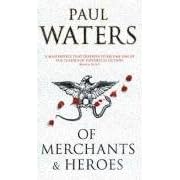
The young Roman protagonist of classicst Paul Waters' first novel, "Of Merchants and Heroes", seeks to find his own identity in a society in the midst of redefining itself, as the traditionally conservative Roman culture begins to embrace, albeit uncertainly, Greek Hellenism at the end of the second Punic War. Born of a landed but impoverished family on a farm in the centuries old city of Praeneste, young Marcus' life takes a dramatic turn when he and his father, along with other travelers, are captured by pirates, led by a ruthless but charismatic rogue named Dicaearchus (Dicearchus, or Diceärch - d.196 BC), an Aetolain rogue (and real historical figure) employed by Philip V of Macedon to raid the Cyclades and Rhodian ships after the second Punic War.
Marcus, alone, escapes and flees to the house of his uncle, a prosperous merchant who has capitalized on the war with Hannibal. Forced to become his uncle's adopted son, Marcus accompanies his uncle to Tarentum where his uncle has obtained a contract to oversee properties seized from Tarentines who supported Hannibal in the recent war. There, he saves the life of the father of Titus Quinctius Flamininus, a man who would play a prominant role in the future of Greco-Roman relationships and command the allied forces of Rome and Greece in the defining battle of Cynoscephalae in 197 BCE.
Titus, like many young elite Romans of the period, had selectively embraced a number of Greek customs while living in Tarentum, a city originally founded by a group of exiled Spartans in the 8th century BCE. Since its founding, Tarentum had become a thriving trading center and bustling seaport where many nations of the ancient Mediterranean co-mingled, sharing ideas and lifestyles. At one of Titus' dinner parties, Marcus encounters his first hetaira, a lady he grows to respect as they encounter each other a number of times throughout the story. Pacifae personifies the skilled courtesan described by Lucian in his Dialogues of the Courtesans:
"In the first place, she dresses attractively and looks neat; she's gay with all the men, without being so ready to cackle as you are, but smiles in a sweet bewitching way; later on, she's very clever when they're together, never cheats a visitor or an escort, and never throws herself at the men. If ever she takes a fee for going out to dinner, she doesn't drink too much--that's ridiculous, and men hate women who do--she doesn't gorge herself--that's ill-bred, my dear--but picks up the food with her finger-tips, eating quietly and not stuffing both cheeks full, and, when she drinks, she doesn't gulp, but sips slowly from time to time....Also, she doesn't talk too much or make fun of any of the company, and has eyes only for her customer. These are the things that make her popular with the men."
But love does not bloom for the young man until he visits the gymnasium and meets Menexanos, a young Athenian athlete. Bisexuality was accepted openly in the ancient world although in Roman society any Roman male engaging in such relationships was expected to take the dominant role. Waters does not examine that aspect of the relationship but rather presents the relationship as a communion of souls who strive to serve their respective homelands and infuse their lives with meaning while cultivating courage and lending support the each other in their quest for achievement and honor. This approach most closely resembles the treatment of bisexual relationships in Mary Renault’s classic “The Last of the Wine”.
Both young men end up as combatants in the famous battle of Cynoscephalae – Menexanos as an Athenian hoplite and Marcus as a Roman tribune – in the climax of the novel.
The thing that struck me as particularly unique about this novel was the development of the character of King Philip V of Macedon. He is usually mentioned only in passing in many books focusing on this period, presumably because Hannibal is such a charismatic figure he steals the show, so to speak. But King Philip V is presented by Waters as quite a dashing, if a bit roguish, commander of note in his own right who mounted a serious threat to Roman dominance in the Aegean. True to his ancestors, he was a master of subterfuge and seemed to have a formidable grasp of both siege and naval warfare. He was an intelligent and perceptive leader who could have easily turned the tables on the Romans if the confrontation at Cynoscephalae had occurred on ground more suited to phalanx tactics than to maneuvers of small Roman maniple units. As it is, the battlefield apparently was not specifically selected by Flamininus, just a fortunate coincidence although I’m sure Flamininus was aware of the phalanx’s maneuvering vulnerabilities. It seemed to be more of a case of Fortuna smiling on the Romans that day rather than a victory resulting from a carefully sprung trap.
I enjoyed this novel immensely and highly recommend it. I think it ranks as one of the best “first” novels I have read and I look forward with anticipation to Waters next effort.
Note: This novel was recently released in the U.S. under the title "The Republic of Vengeance."




No comments:
Post a Comment